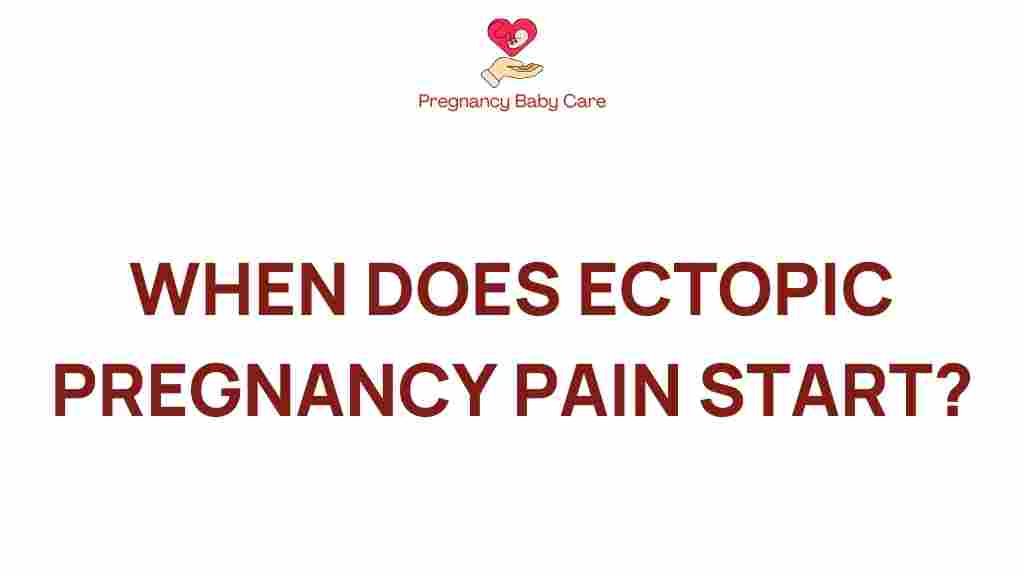Unraveling the Mystery: When Does Ectopic Pregnancy Pain Begin?
When it comes to women’s health and reproductive health, understanding the signs and symptoms of an ectopic pregnancy is crucial. An ectopic pregnancy occurs when a fertilized egg implants outside the uterus, most commonly in a fallopian tube. This condition can lead to serious health risks if not diagnosed and treated promptly. One of the first indicators of an ectopic pregnancy is abdominal pain, but when does this pain begin? In this article, we will explore the early signs of ectopic pregnancy, how to recognize them, and the importance of seeking medical advice.
Understanding Ectopic Pregnancy
Ectopic pregnancies can happen in various locations, including:
- Fallopian tubes (most common)
- Ovaries
- Abdominal cavity
- Cervix
As the pregnancy progresses outside the uterus, it can lead to severe complications. Recognizing the early signs is essential for timely intervention. Let’s delve into the timeline of when ectopic pregnancy pain begins and how to differentiate it from normal pregnancy symptoms.
Identifying Early Signs of Ectopic Pregnancy
The early signs of pregnancy can often mask the symptoms of an ectopic pregnancy. Typically, women may experience:
- Missed period
- Breast tenderness
- Nausea and vomiting
- Fatigue
However, it’s critical to pay attention to additional symptoms that could indicate an ectopic pregnancy, especially if you experience:
- Severe abdominal pain
- Pain on one side of the body
- Vaginal bleeding
- Shoulder pain (referred pain)
- Weakness or dizziness
When Does Ectopic Pregnancy Pain Begin?
Ectopic pregnancy pain can start as early as six weeks into the pregnancy. However, some women may experience discomfort even earlier. The pain often begins as mild cramping and can progressively worsen. Here’s a breakdown of the typical timeline:
- Weeks 4-6: Some women may notice light cramping or discomfort on one side of the abdomen.
- Weeks 6-8: The pain may become more pronounced and is often accompanied by vaginal bleeding.
- Weeks 8 and beyond: If the ectopic pregnancy continues to progress, the pain can become severe and may indicate rupture, which is a medical emergency.
Recognizing Abdominal Pain
Abdominal pain is a common symptom of ectopic pregnancy. It’s essential to differentiate this pain from normal pregnancy-related discomfort. Ectopic pregnancy pain typically has the following characteristics:
- Localized: Often felt on one side of the abdomen.
- Sharp or stabbing: Unlike the dull cramps of a normal pregnancy.
- Persistent: Does not subside with rest or changes in position.
Diagnosis of Ectopic Pregnancy
If you suspect an ectopic pregnancy, it’s crucial to seek medical advice immediately. Diagnosis typically involves:
- Pelvic Examination: A healthcare provider may perform a pelvic exam to check for tenderness or abnormal masses.
- Ultrasound: A transvaginal ultrasound can help visualize the location of the pregnancy.
- Blood Tests: Measuring the levels of hCG (human chorionic gonadotropin) can help determine if the pregnancy is progressing normally.
It’s important to note that an ectopic pregnancy can be life-threatening. If you experience severe pain, heavy bleeding, or fainting, seek emergency medical care immediately.
Healthcare Options for Ectopic Pregnancy
Once diagnosed, there are several treatment options available, including:
- Medication: Methotrexate can be used to stop the growth of the ectopic tissue.
- Surgery: In some cases, surgery may be necessary to remove the ectopic tissue and prevent complications.
- Monitoring: If the ectopic pregnancy is not progressing, your healthcare provider may suggest monitoring your condition closely.
Troubleshooting Common Concerns
As a woman experiencing potential symptoms of ectopic pregnancy, you may have several concerns. Here are some common questions and answers:
1. Is all abdominal pain during pregnancy a sign of ectopic pregnancy?
No, not all abdominal pain is indicative of an ectopic pregnancy. Many women experience cramping due to normal pregnancy changes. However, if the pain is severe, persistent, or accompanied by other symptoms like bleeding, it’s essential to consult a healthcare professional.
2. Can an ectopic pregnancy be mistaken for a miscarriage?
Yes, the symptoms of ectopic pregnancy can sometimes mimic those of a miscarriage, including abdominal pain and bleeding. However, the location of the pregnancy and the associated pain will differ. Always seek medical advice for proper diagnosis.
3. What should I do if I think I have an ectopic pregnancy?
Contact a healthcare provider immediately. Early diagnosis and treatment are crucial for your health.
Conclusion
Understanding when ectopic pregnancy pain begins is vital for women’s health and reproductive health. Early recognition of symptoms, particularly abdominal pain, can lead to timely diagnosis and treatment, preventing serious complications. If you experience any signs that concern you, do not hesitate to seek medical advice.
By staying informed about the early signs of ectopic pregnancy, women can better advocate for their health and well-being. For more information on women’s reproductive health, consider visiting this resource.
Remember, your health is your wealth, and being proactive about your reproductive health can make all the difference. If you have any questions or concerns about ectopic pregnancy, reach out to your healthcare provider for guidance.
This article is in the category Pregnancy and created by PregnancyBabyCare Team
